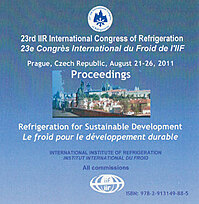
Document IIF
Évaluation des avantages d'une conception de pompe à chaleur fondée sur l'utilisation d'un modèle dynamique à paramètres groupés.
Evaluation of the benefits in heat pump design when using a dynamic lumped-parameter model.
Résumé
A heat pump dedicated to building heating (e.g., of the air-to-water type) is subject to variations in the cold source temperature, in the load demand or even in capacity when performance is aimed at. Such changes influence the internal behaviour of the heat pump and a ad hoc control can be achieved provided that a dynamic model describing the mass and heat balances is used.
The authors introduce a dynamic, lumped-parameter model based on moving-boundary exchanger sub-models, static compressor and expansion valve sub-models. The interests of the model for heat pump sizing or for the design of thesuperheating control are shown. Moreover, a refined version of the model is presented here as the desuperheating region of the condenser is described separately, instead of being merged into the condensation region. The benefits of this enhancement are evaluated with respect to the superheating control. Validation through experience will take place in a future but high-priority development step.
Documents disponibles
Format PDF
Pages : 8 p.
Disponible
Prix public
20 €
Prix membre*
Gratuit
* meilleur tarif applicable selon le type d'adhésion (voir le détail des avantages des adhésions individuelles et collectives)
Détails
- Titre original : Evaluation of the benefits in heat pump design when using a dynamic lumped-parameter model.
- Identifiant de la fiche : 30001983
- Langues : Anglais
- Source : Proceedings of the 23rd IIR International Congress of Refrigeration: Prague, Czech Republic, August 21-26, 2011. Overarching theme: Refrigeration for Sustainable Development.
- Date d'édition : 21/08/2011
Liens
Voir d'autres communications du même compte rendu (569)
Voir le compte rendu de la conférence
Indexation
-
Comprehensive modeling of a chemical looping he...
- Auteurs : KIM J., BRAUN J. E., GROLL E. A., ZIVIANI D.
- Date : 05/2021
- Langues : Anglais
- Source : 2021 Purdue Conferences. 18th International Refrigeration and Air-Conditioning Conference at Purdue.
- Formats : PDF
Voir la fiche
-
An air-water dual-source heat pump system for s...
- Auteurs : CHENG J. H., GAO P., CAO X., SHAO P., SHAO L. L., ZHANG C. L.
- Date : 31/08/2021
- Langues : Anglais
- Source : 13th IEA Heat Pump Conference 2021: Heat Pumps – Mission for the Green World. Conference proceedings [full papers]
- Formats : PDF
Voir la fiche
-
Research on the triple system based on solar an...
- Auteurs : LIU Q., PAN H., CAI M.
- Date : 06/04/2018
- Langues : Anglais
- Source : 5th IIR International Conference on Sustainability and the Cold Chain. Proceedings: Beijing, Chine, 6-8 avril 2018
- Formats : PDF
Voir la fiche
-
Laboratory characterization of a cascade heat p...
- Auteurs : MENEGON D., CAMPIDELLI M., FEDRIZZI R.
- Date : 05/2023
- Langues : Anglais
- Source : 14th IEA Heat Pump Conference 2023, Chicago, Illinois.
- Formats : PDF
Voir la fiche
-
INTERACTION OF HEAT EXCHANGER DESIGN AND HEAT P...
- Auteurs : FEHLE R., KLAS J., MAYINGER F.
- Date : 12/03/1990
- Langues : Anglais
Voir la fiche
